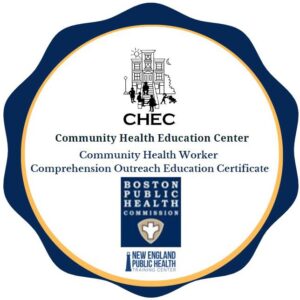Public Health Training Centers Supporting Community Health Workers
- By: Lisa Tobe, MPH, MFA and Lauren Milliken, MSW, MPH
- Date
Community Health Workers (CHWs) hold a unique and essential role within the public health workforce. CHWs often share life experiences, socioeconomic status, and language with people in the communities where they work. This community connection is usually part of the hiring criteria. As a result, CHW workforce is among the most ethnically and linguistically diverse in public health. Their wide range of roles and responsibilities includes providing health education, assistance in accessing medical and behavioral health support services, and language translation services, to name a few.
 This frontline work is often unheralded, and the workers themselves are underpaid. However, the importance of CHWs’ role in the public health workforce is becoming more evident. Research shows that CHW-led interventions are cost-effective, reduce health disparities in communities of color, and improve posthospital care. Working as trusted members of their communities, CHWs became more prominently recognized throughout the COVID-19 Pandemic for their ability to connect socially isolated patients to critically vital care and social support.
This frontline work is often unheralded, and the workers themselves are underpaid. However, the importance of CHWs’ role in the public health workforce is becoming more evident. Research shows that CHW-led interventions are cost-effective, reduce health disparities in communities of color, and improve posthospital care. Working as trusted members of their communities, CHWs became more prominently recognized throughout the COVID-19 Pandemic for their ability to connect socially isolated patients to critically vital care and social support.
A recent increase in financial support reflects the mainstream acknowledgment that CHWs are essential for strengthening national public health infrastructure. For instance, the American Rescue Plan Act of 2021 allocated $250 million to increase the hiring of CHWs at community-based organizations and public health departments for COVID-19 vaccination efforts.
There is no conventional career pathway for CHWs. As a result, CHWs who want to progress in the public health field are forced to seek their own paths for career advancement. A range of training and certifications are available to help support the professional development of CHW. Some states have developed standardized core competency training and certification requirements for CHWs, but no nationally recognized curriculum has been developed to date.
With over 20 years of experience in public health workforce development, Public Health Training Centers (PHTCs) are well-positioned to support pathways through various types of collaboration with CHW organizations. These regionally based training centers have channeled their wealth of knowledge to develop needs assessment and training (Region 9), social support (Region 3), and certification support (Region 1) for CHWs.
Public Health Training Centers Focus on Community Health Worker Trainings
Case 1: Western Region Public Health Training Center Focuses on CHW Needs and Trainings
PHTCs collectively focus on identifying and serving the needs of the public health workforce. Numerous initiatives are geared to aid CHWs across the ten regionally based centers. The Western Region Public Health Training Center (WRPHTC), housed at University of Arizona College of Public Health, has focused on finding the gaps in CHW training and filling them.
Working within Health Resources & Services Administration (HRSA) Region 9 (Arizona, California, Nevada, Hawaii, and U.S. Associated Pacific Islands), WRPHTC worked with its regional partners to develop an online Public Health Core Competency Self-assessment and Training Preferences Survey (PHCCSTPS). More than 5,000 CHWs throughout the region have completed this needs assessment. Based on the survey results, WRPHTC curated training bundles to serve CHW organizations’ needs.
One of WRPHTC’s most popular pieces of training from their catalog is Public Health Essentials in Action, a 60-minute course on Public Health 101. This interactive training provides an overview of the most fundamental aspects of public health understanding and helps public health professionals develop their distinctive role in public health. The Public Health Ethics training, another popular training in the WRPHTC catalog, helps learners understand a clear definition public health ethics, review foundations and theories of moral philosophy and applied ethics, and identify key ethical issues in public health. This self-paced 1.5-hour course teaches participants to identify healthcare dilemmas and discover resolutions.
Case 2: Mid-Atlantic Regional Public Health Training Center Hosts a Support Group
Given the high grief, stress, and loss rates CHWs typically face, creating avenues for self-care can help CHWs maintain their health, capacity, and commitment to their high-demand work. Mid-Atlantic Regional Public Health Training Center at the University of Pittsburgh, which serves the Region 3 states of Delaware, Maryland, Pennsylvania, Virginia, Washington D.C., and West Virginia, is currently offering support groups as a form of self-care for public health workers. One of the many benefits of support groups is that they bring together people who are going through similar experiences.
The support group—Take a Break: Social Support for the Public Health Workforce—provides an informal yet professionally facilitated outlet for public health workers to focus on their emotional health and well-being. The group is a haven for discussing experiences, stressors, and professional successes with other public health professionals. Participants can find comfort knowing they have a professional outlet for support while engaging with peers.
“PHTCs have been aiming for a while to support the community health worker population.” – Karla Todd Barrett
The New England Public Health Training Center (NEPHTC), together with CHW training partners such as the Boston Public Health Commission’s Community Health Education Center (CHEC), provides training development, online event hosting, learning management systems, and evaluation capabilities, all of which have been used to improve CHW training and career development. “PHTCs have been aiming for a while to support the community health worker population,” said Karla Todd Barrett, MBA, MSN, Senior Program Manager and Training Specialist at NEPHTC. “And it’s a growing and increasingly recognized part of the workforce.”
In 2016, NEPHTC conducted an environmental scan to gather data on regional support, career trends, and what role NEPHTC could play in filling needs within Region 1 (Massachusetts, Connecticut, Maine, New Hampshire, Rhode Island, and Vermont). The CHW Environmental Scan consisted of a review of state and local reports and resources and a series of group interviews of CHW supporters within the region. The scan revealed that CHW advocates were present in each state and there was a general workforce trend to build out CHW credentialing. Recommendations included NEPHTC working with CHW allies looking to improve their CHW training infrastructure. In the Boston Public Health Commission’s CHEC, a training and networking center of Boston’s health department, they found just such an ally.
 BPHC and NEPHTC’s relationship started nearly two decades ago when they worked on management training (“Managing Effectively in Today’s Public Health Environment”). Eight years ago, with a solid foundation based on mutual trust, BPHC’s CHEC and NEPHTC began a partnership on adding emerging CHW training needs to the CHEC curriculum, with a concentration on trauma informed conversation training. As courses increasingly moved online, NEPHTC began providing educational technology support to BPHC-CHEC’s Comprehensive Outreach Education Certification (COEC). Both BPHC-CHEC and NEPHTC bring a significant amount of experience to this collaborative work. BPHC’s Community Health Education Center (CHEC) has provided CHW training since 1993. Since the 2016 environmental scan, NEPHTC has partnered with state and local organizations to deliver more than 35 programs prioritizing CHWs in their region.
BPHC and NEPHTC’s relationship started nearly two decades ago when they worked on management training (“Managing Effectively in Today’s Public Health Environment”). Eight years ago, with a solid foundation based on mutual trust, BPHC’s CHEC and NEPHTC began a partnership on adding emerging CHW training needs to the CHEC curriculum, with a concentration on trauma informed conversation training. As courses increasingly moved online, NEPHTC began providing educational technology support to BPHC-CHEC’s Comprehensive Outreach Education Certification (COEC). Both BPHC-CHEC and NEPHTC bring a significant amount of experience to this collaborative work. BPHC’s Community Health Education Center (CHEC) has provided CHW training since 1993. Since the 2016 environmental scan, NEPHTC has partnered with state and local organizations to deliver more than 35 programs prioritizing CHWs in their region.
Each organization provides an indispensable form of support for the COEC process. NEPHTC, known for its wide range of training programs designed to strengthen the public health workforce, provides the learning management system (LMS) used to deliver the content for the COEC certification. LMSs are often cost-prohibitive, especially for health departments. Since PHTCs all invest and manage hundreds of online courses per year, requiring LMS management as a core capability, their partners can leverage this system and technical support. The LMS is used to deliver and manage all the courses and needed resources for the participants.
This 80-hour training program introduces a public health framework to CHWs. These trainings encourage CHWs to gain skills on various health issues that affect the diverse communities they serve and are often a part of. Though the current format is online, CHWs are highly involved in their learning. “CHWs love to learn, they’re inquisitive, and they love to interact,” said Alyssa Faria, MPH, a training manager for NEPHTC. “If we have microphones available, they’re using them. It’s really nice to see that.”
BPHC-CHEC handles much of the content, delivery, and program management, which would have been difficult for a public health training center to support alone financially. The organization provides a director, project manager, two project coordinators, and a senior resiliency trainer for the effort. The COEC training is developed by internal staff and external partners. “Some of those (external) partners have been with us from the very beginning, and they still are delivering content,” said Anjali Nath, a Program Director at BPHC. “We have had the very good fortune of finding and nurturing the relationships, maintaining those relationships with really experienced and dedicated trainers who are very connected to the unique work of CHWs.”
Community health workers are vital to a robust public health infrastructure. Many gains have been made in expanding and supporting CHW and career development opportunities, such as those initiated by regional PHTCs. “PHTCs have all these different public health skills, and we also have all these educational technology skills,” said Todd Barrett. “Those combined skill sets are needed right now in workforce development. Examples of these relationships, such as the relationship with BPHC-CHEC, show how over time, a lot of creative learning offerings will happen by working together.”
Public health training centers, and their partnering organizations, can intentionally and strategically elevate the CHW workforce.

 Subscribe To Our Communications
Subscribe To Our Communications